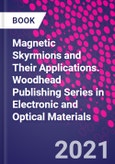Magnetic skyrmions are particle-like objects described by localized solutions of non-linear partial differential equations. Up until a few decades ago, it was believed that magnetic skyrmions only existed in condensed matter as short-term excitations that would quickly collapse into linear singularities. The contrary was proven theoretically in 1989 and evidentially in 2009. It is now known that skyrmions can exist as long-living metastable configurations in low-symmetry condensed matter systems with broken mirror symmetry, increasing the potential applications possible. Magnetic Skyrmions and their Applications delves into the fundamental principles and most recent research and developments surrounding these unique magnetic particles.
Despite achievements in the synthesis of systems stabilizing chiral magnetic skyrmions and the variety of experimental investigations and numerical calculations, there have not been many summaries of the fundamental physical principles governing magnetic skyrmions or integrating those concepts with methods of detection, characterization and potential applications. Magnetic Skyrmions and their Applications delivers a coherent, state-of-the-art discussion on the current knowledge and potential applications of magnetic skyrmions in magnetic materials and device applications.
First the book reviews key concepts such as topology, magnetism and materials for magnetic skyrmions. Then, charactization methods, physical mechanisms, and emerging applications are discussed.
Please Note: This is an On Demand product, delivery may take up to 11 working days after payment has been received.
Table of Contents
1�Magnetism and topology
Andre' Thiaville, Jacques Miltat, and Stanislas Rohart
2�Materials for skyrmionics
Kai Litzius and Mathias Klaui
3�Characterizing magnetic skyrmions at their fundamental length and time scales
Peter Fischer and Sujoy Roy
4�Mapping the magnetic field of skyrmions and spin spirals by scanning probe microscopy
Hans J. Hug
5�Scanning probe microscopy methods for imaging skyrmions and spin spirals with atomic resolution
Hans J. Hug
6�Static properties of magnetic skyrmions�
Roberto Zivieri and Oksana Chubykalo-Fesenko
7�Dynamics of magnetic skyrmions
Riccardo Tomasello, Luis Sa�nchez-Tejerina, and Mario Carpentieri
8�Electrical nucleation and detection of magnetic skyrmions�
Felix Buttner and William Legrand
9�Topological Hall effect�
Igor Rozhansky and Konstantin Denisov
10�Skyrmions in ferrimagnets
Xichao Zhang, Yan Zhou, and Seonghoon Woo
11�Skyrmions in antiferromagnets
Oleg A. Tretiakov
12�Multiple skyrmionic states and oblique spirals in bulk cubic helimagnets
Andrey O. Leonov and Catherine Pappas
13�Conventional applications of skyrmions
Xichao Zhang, Jing Xia, Laichuan Shen, Motohiko Ezawa, Xiaoxi Liu, and Yan Zhou
14�Unconventional applications of skyrmions
Wang Kang, Sai Li, Xing Chen, Daoqian Zhu, Xueying Zhang, Na Lei, and Weisheng Zhao
15�Introduction to topology
Gabriele Bonanno and Giuseppina D'Agui`
�








